TMG, short for trimethylglycine, is a biologically active compound sometimes also known as betaine that can be taken for heart health, liver health, and improved athletic performance in both strength and endurance events.
It’s found in abundant quantities in spinach, quinoa, and seafood, but is also available as a supplement. For optimal health and performance, keeping your body’s TMG levels high is a worthy goal.
Here are the ten best TMG supplements on the market, ranked according to quality.
Research
Rankings
1. Nutricost TMG
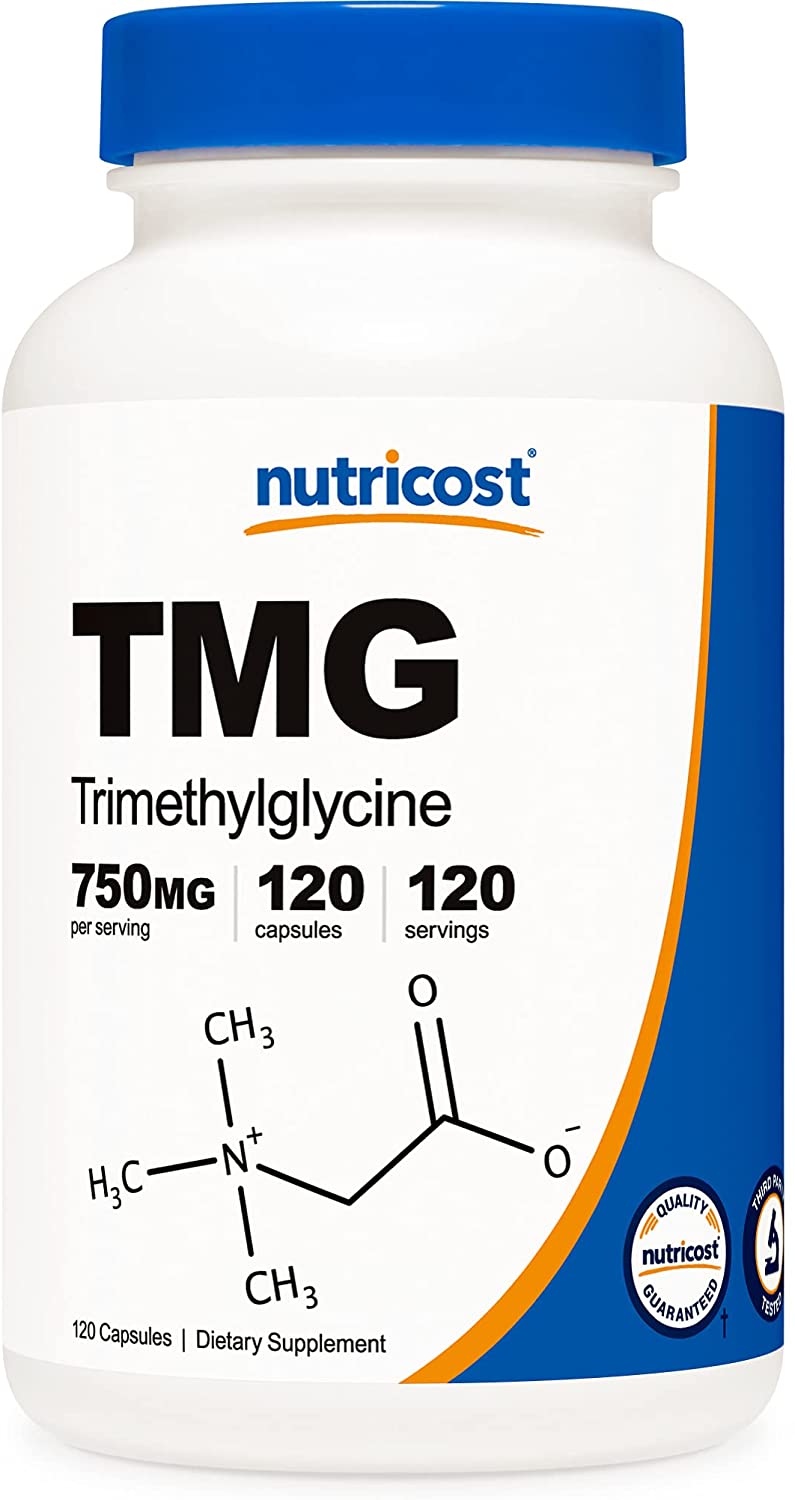
Nutricost TMG capsules are a great choice for a simple TMG supplement with a moderate dosage.
At 750 mg, delivered in a gelatin capsule and without any additional ingredients save for rice flour, it is an excellent and reliable TMG supplement for almost everybody.
2. Life Extension TMG
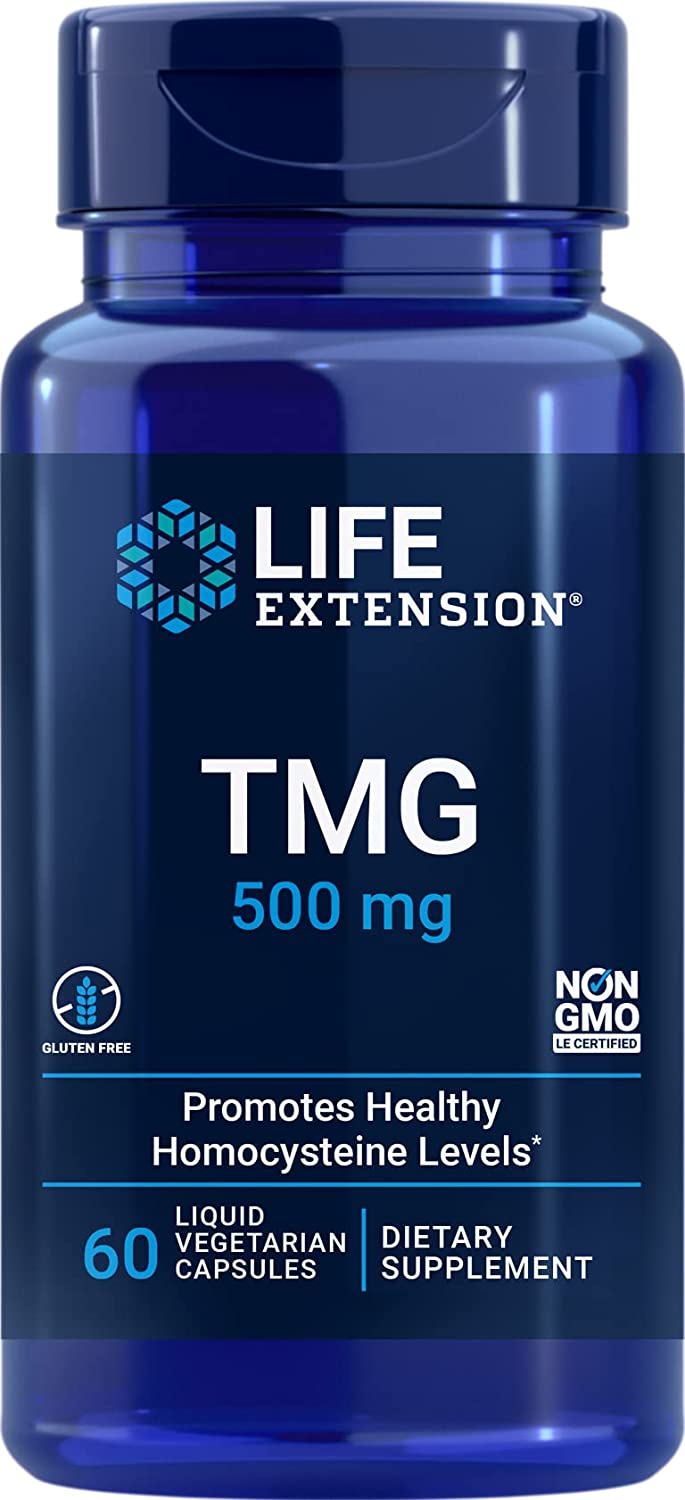
Life Extension TMG has a moderate dose and a simple ingredients list. Each gelatin capsule contains 500 mg of TMG, and, aside from cellulose and water, zero additional ingredients.
If you don’t need a super-high dosage, Life Extension TMG is a excellent choice.
3. Glorifikation Liposomal NMN + Resveratrol + TMG
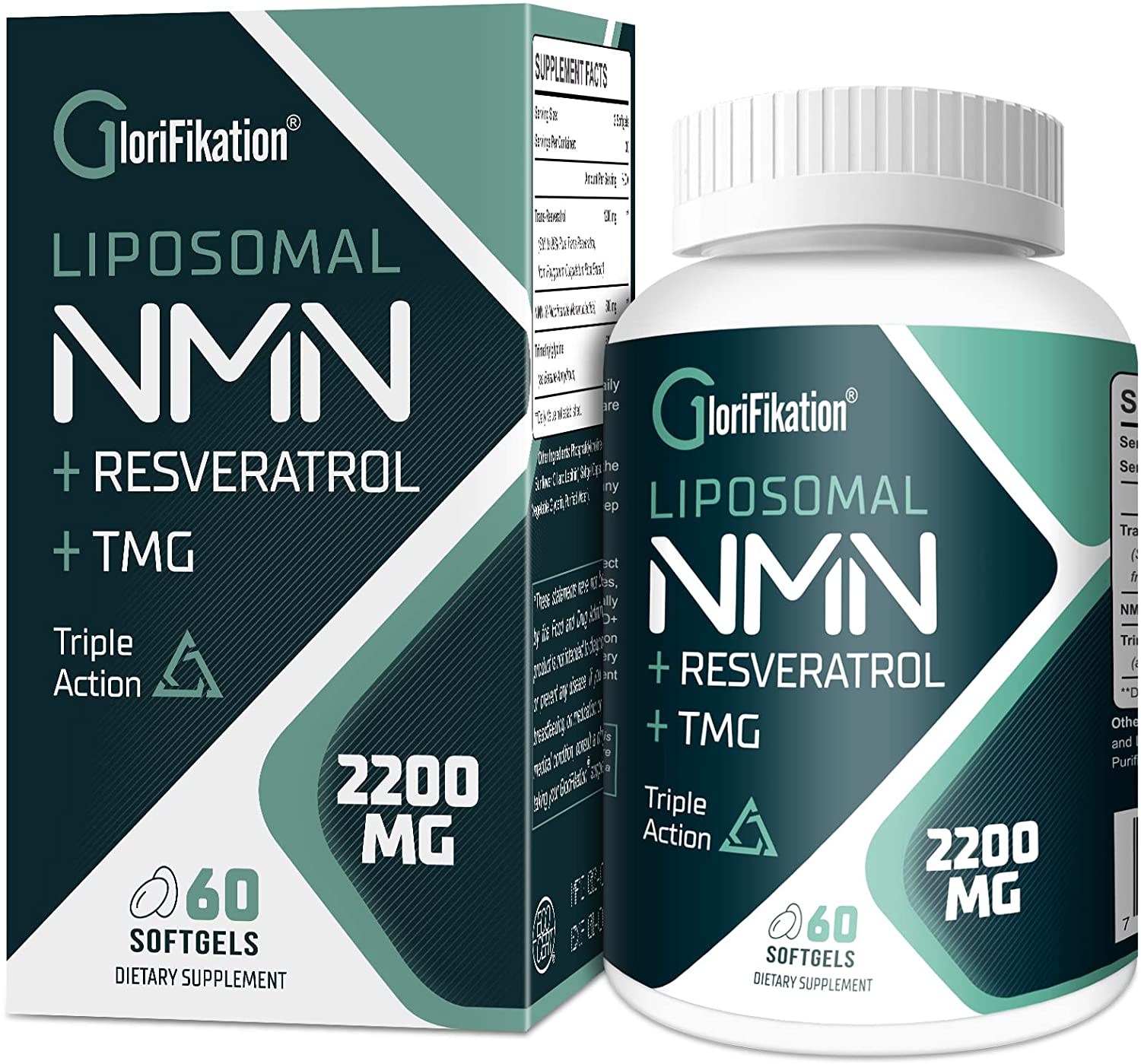
Glorifikation makes a TMG / NMN combo supplement that is specially tailored for anti-aging and antioxidant applications. It combines a 500 mg dosage of both TMG and NMN with a 1200 mg dose of the potent antioxidant resveratrol (found in superfoods like cocoa and red wine). Though it’s not the best option for athletes, it’s great for older adults.
4. NOW Foods Extra Strength TMG
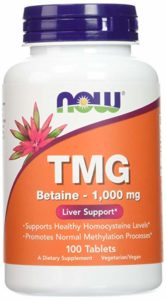
NOW Foods Extra Strength TMG contains 1000 mg of TMG per capsule, in anhydrous form, and while it’s pretty popular, the ingredients list is a bit longer than necessary. That aside, it’s one of the few high-dose capsule-based TMG supplements on the market.
It’s still a pretty solid supplement but it could do without a few of the stabilizers.
5. BulkSupplements Pure Betaine Anhydrous Trimethylglycine
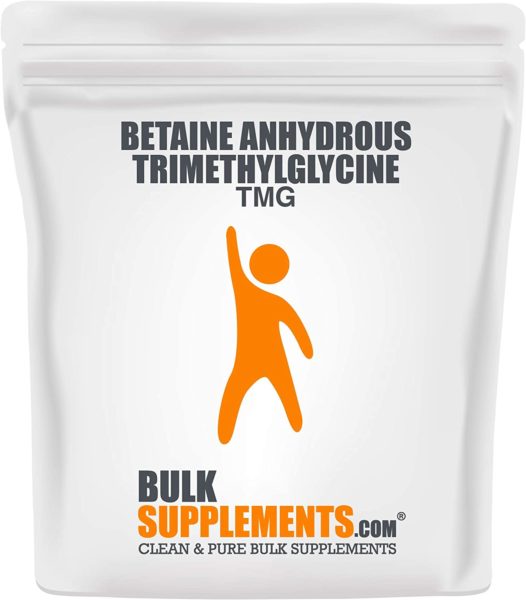
For high-dose users, or for anyone who wants to mix TMG into their own custom-made shake or smoothie powder base, BulkSupplements is the way to go.
Measuring out the loose powder yourself can be a pain, and does require a precision scale for accurate dosing, but it’s hard to beat BulkSupplements if you go through a large amount of TMG on a regular basis.
6. Allergy Research Group TMG
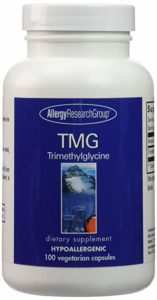
Allergy Research Group is a smaller, more specialized supplement manufacturer that makes a TMG supplement with 750 mg of TMG per capsule.
The supplement ingredient formulation is average; it’s got a couple of extra ingredients, but nothing excessive. It’s an okay choice for a middle of the road dosage.
7. Kirkman TMG Liquid
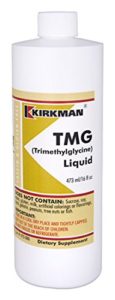
For those who don’t want to bother with capsules, or for those who want more precise control over their TMG dosing, Kirkman offers a unique solution.
This liquid TMG supplement dissolves TMG in water and adds some flavoring and sweetening agents to make it taste better. It’s calorie-free, but that’s because it uses the sugar substitute sorbitol.
Still, it’s a favorite for use with people who can’t or won’t take capsule-based supplements because it’s very easy to administer.
8. Nutracost Betaine Anhydrous Trimethylglycine
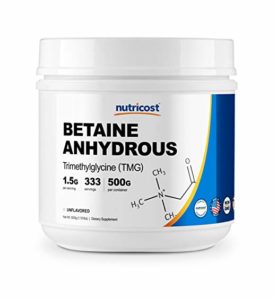
In addition to its capsule-based supplements, Nutracost makes a powder-form TMG supplement for bulk users. Unfortunately, this supplement doesn’t quite stack up.
The presence of silicon dioxide and calcium silicate negates one of the primary advantages of getting a powder based supplement instead of a capsule based one; namely, the better purity. Most people will be better off with a different powder-based TMG, or Nutracost’s own capsule-based form.
9. Swanson TMG
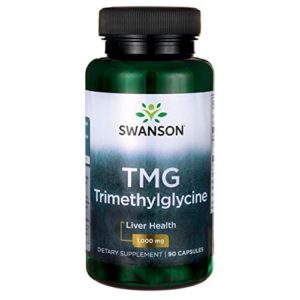
Swanson TMG is a fairly average TMG supplement. Each capsule has 500 mg of TMG, and its ingredients list is a bit bloated with more fillers and binders than necessary.
It’s hard to rank this TMG supplement much higher due to its inability to distinguish itself from the crowd.
10. Kirkman TMG
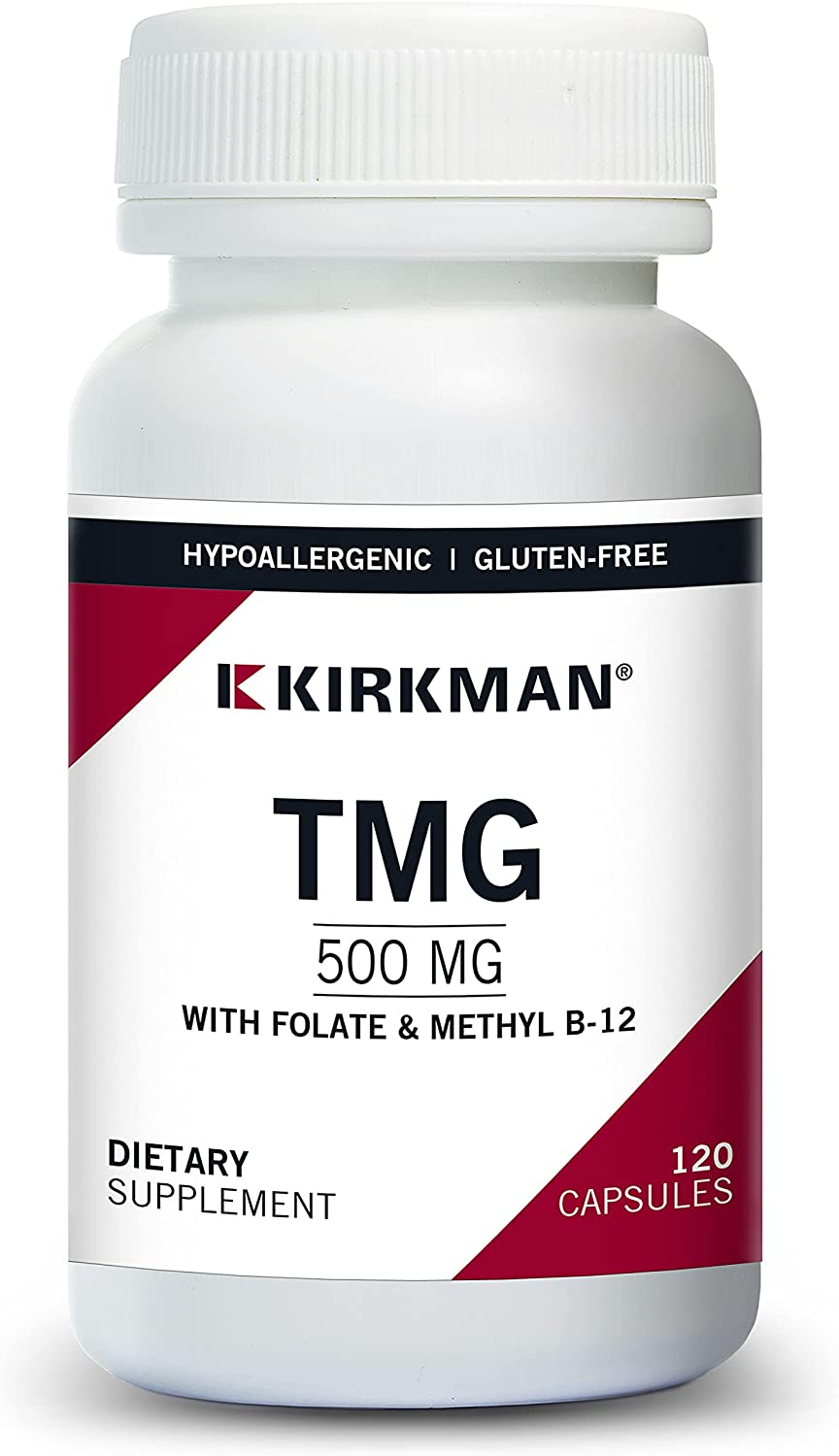
Kirkman TMG has a pretty standard 500 mg dosage of TMG, and also includes folate and vitamin B12. While this is a nice combo if you know you are specifically looking for these two other supplements, the use cases do not overlap much, so for most users a TMG-focused supplement would be a better choice.
Category winners
Best TMG overall: Nutricost TMG
Whether your goal is optimal health or optimal performance, you can’t go wrong with Nutricost TMG. With a simple formulation and highly effective dosage, Nutricost TMG is an incredibly versatile TMG supplement that’s well-suited for just about everyone.
Best TMG for heart health: Nutricost TMG
Nutricost TMG offers an effective dosage in a simple package—and that’s exactly what you want for cardiovascular health. At 750 mg per capsule, it gets you 50% more TMG than much of the competition, without fillers, bulking agents, or other supplements coming along for the ride.
Best TMG for anxiety: Life Extension TMG
TMG is seeing increasing use for mood support, and for this purpose the moderate dosage and ultra-pure formulation of Life Extension TMG is the perfect fit. With no ancillary ingredients or other supplements along for the ride, you can be sure any calming effects you see are directly caused by the TMG.
Best TMG for liver health: NOW Foods Extra Strength TMG
NOW Foods makes a high-dosage version of their TMG supplement that is specifically tailored for supporting liver health. At 1000 mg per capsule, it delivers enough bioactive TMG to substantially upregulate your homocysteine levels in your liver.
Best TMG for athletes: Nutricost TMG
Our top overall pick is also our top pick for athletes. Thanks to its powerful dosage and clean formulation, Nutricost TMG is well-suited to deliver the endurance and cardiovascular function benefits promised by trimethylglycine.
Best TMG with NMN: Glorifikation Liposomal NMN + Resveratrol + TMG
TMG and NMN are a widely-lauded anti-aging formulation, thanks to the synergistic effects of these two biologically active compounds. Our pick for a TMG/NMN combo is Glorifikation, due to its balanced dose of NMN and TMG, plus a hefty amount of resveratrol for added antioxidant power.
Who should buy TMG?
TMG is safe for the vast majority of the population and is great for improving cardiovascular health, lowering inflammation, and protecting your liver from damage. It can also drastically reduce high homocysteine levels, which have been associated with various diseases, including osteoporosis and heart disease.
Due to the lack of research, pregnant women and children should avoid TMG until more conclusive evidence surfaces regarding the safety in these populations. People with cholesterol issues should also avoid TMG as it has been shown to increase LDL and total cholesterol in some cases.
Athletes have been known to take TMG as it has been shown (rather unreliably) to boost performance when taken at doses of 2.5g per day. While there are no medications that interact with TMG, you should still speak to your doctor before starting a TMG supplement regimen if you are currently taking any prescription medications, to be safe.
How we ranked
TMG can come under a variety of names, including betaine, Glycine betaine, and oxyneurine, which is why you’ll find a variety of product names on our list. In terms of dosages, 1000mg is seen as the minimum effective dose, with 2.5g seen as the tipping point (especially for bigger people). As such, we preferred products that included at least 500mg per serving as this provides the easiest option for both tailoring the dose and titration for beginners. This is the main reason why Life Extension ranked in our top 5.
Next, we looked at purity. We wanted all the products on our list to have minimal fillers, binders, additives, and coloring agents. Anything that included excessive amounts of these were either axed or severely penalized in terms of rankings. Products like Nutricost TMG ranked well here for providing a product with just one ingredient: TMG.
TMG supplements come in 2 main forms: capsule form and powder. In terms of effectiveness, they are both fairly equal, but we did have a slight preference for capsule-based products. The main reason for this was the accuracy of dosing and convenience, which is why products like Nutricost took the top spot over more pure products like Bulk Supplements TMG powder. For capsules, we did have a slight preference for cellulose-based ones over gelatin ones. This was more to avoid common allergens and wasn’t a deal-breaker in many cases.
On our list, you’ll also find a liquid TMG supplement. While it’s easy to administer, it does contain more flavoring agents than we’d like. It is also unclear how even the dose is per serving as well as if the water it is included in makes the TMG less effective. This is why the Kirkland TMG liquid ranked in our bottom five.
Benefits
TMG can improve cardiovascular health by reducing homocysteine. Homocysteine is an amino acid, but it’s not one of the essential amino acids that you get from food. Instead, it’s a metabolic precursor to other compounds your body needs.
When homocysteine levels get too high, they can cause damage and inflammation to the cells that line the inside of your blood vessels. TMG, in turn, can reduce homocysteine levels. That makes it—theoretically at least—a potential protective agent for heart health.
Research backs up this hypothesis: according to a scientific review article by Per Magne Ueland at the University of Bergen in Norway, clinical studies have found a link between low levels of TMG in the blood and cardiovascular disease risk factors (1).
The cardiovascular benefits of lowering homocysteine with TMG are blunted by some negative effects on cholesterol levels. Research published in the journal PLoS Medicine by a group of scientists in the Netherlands found that, while TMG does lower levels of homocysteine, and thus improves your overall cardiovascular disease risk profile, it also has the tendency to raise your LDL cholesterol (2).
LDL cholesterol colloquially known as “bad” cholesterol because high levels of it have been linked to heart disease. This probably means that TMG is a poor choice for people who have high cholesterol already, but as pointed out by S.H. Zeisel at the University of North Carolina at Chapel Hill, the homocysteine/LDL trade off may be a favorable one for some people when it comes to lowering their overall risk of heart disease (3).
TMG could reduce the inflammatory problems associated with obesity. One of the biggest reasons that obesity is a threat to health is not so much the extra weight and fat, per se.
It’s the fact that the high levels of fat create chronic, low-grade inflammation in your body. This is the source of the biggest threats to health from obesity: type two diabetes, heart disease, and cancer (4).
Recent research from researchers in Finland that was published in 2013 in the British Journal of Nutrition suggests that TMG could help tamp down on the inflammation associated with obesity.
Using cultures of human fat cells, the researchers showed that fat cells exposed to TMG produced fewer pro-inflammatory compounds. While a TMG supplement may not help with weight loss directly, taking TMG could reduce some of the negative health effects of being overweight, thereby speeding your return to health.
TMG can help protect your liver from damage. One cause of serious liver damage and liver disease is the buildup of fatty acids in liver tissue. Scientific studies have found that TMG actively fights the buildup of fat in the liver, and could be used to improve liver health.
Fatty liver disease can be caused either by chronic and excessive alcohol consumption or by obesity and high dietary intake of sugar, but the effects are the same.
One study published in the journal Alcoholism, Clinical and Experimental Research in 1997 demonstrated that a TMG supplement fed to rats could reverse the damage to the liver caused by excessive alcohol consumption (5).
Interestingly, the homocysteine pathway we saw earlier in relation to heart disease reappears in liver disease too. Other research has connected high homocysteine levels with liver damage and liver disease, and since TMG is known to decrease levels of homocysteine, it’s been investigated as a potential agent for treating or even preventing damage to the liver (6).
TMG can improve exercise performance. Thanks possibly to its role in DNA repair, TMG shows strong evidence of a performance-enhancing effect in both resistance and endurance exercise.
According to research published in 2011 in the Journal of Strength and Conditioning Research, TMG can increase muscular oxygen consumption, thereby increasing number of lifts to fatigue in resistance training (7). The study demonstrated that a 2.5 gram dose of TMG increased number of reps to failure, as well as total volume of weight moved.
The researchers drew a direct connection between the improvement in lifting performance and the superior levels of muscular oxygen uptake. Other research has found that TMG could be useful in endurance performance too. A review study by Stuart Craig published in the American Journal of Clinical Nutrition cites research showing that TMG supplementation improves repeated sprint performance and improves both aerobic and anaerobic metabolism (8).
Interestingly, TMG appears to be particularly effective at augmenting endurance performance in very hot conditions, though it’s not clear why. This is an area of active research.
Side effects
TMG is found in fairly high concentrations in many healthy foods—spinach and quinoa, for example, are nearly 1% betaine by weight.
As such, even fairly high doses of TMG are unlikely to cause any acute side effects (at least to no greater extent than eating a lot of quinoa or spinach would.
The primary adverse effect to be aware of is the previously-mentioned long-term effects on LDL cholesterol level. TMG is not the best supplement for people who know they have high cholesterol, unless you’re specifically instructed to take TMG by your doctor. People who fit this description might want to choose a different supplement for heart health, such as fiber or fish oil.
Recommended dose
Direct recommendations on TMG dosage from clinical trials are lacking, but it’s possible to derive some guidelines from other research and knowledge about TMG. Some researchers have estimated that the average person gets anywhere from 0.5 to 2.5 grams of TMG per day in a typical diet (9).
The same study suggests that rapid and substantial drops in homocysteine can be achieved by doses of six grams of TMG per day, though considering the typical person’s daily intake, starting with a dose more like one to two grams of TMG per day should be effective (this would represent a doubling of the typical person’s intake).
The high end of this range is also in line with the TMG doses used in studies on exercise performance.
FAQ
What does TMG stand for? TMG stands for Trimethylglycine but is also commonly known as Betaine anhydrous.
What happens if I take too much TMG? It’s difficult to take too much TMG, and if you do, the results can be difficult to detect. However, if you take a large dose and you start to feel fatigued, nauseous, dizziness, hair loss, or a general feeling of unwellness, your body may be sensitive to larger doses. Some people need a smaller dose to feel the effects of TMG. If you feel that you’ve taken too much TMG, please contact your doctor, or for more immediate medical attention, contact poison control or go to your nearest emergency room.
Should I take TMG if I am taking other medications? There are no notable interactions between medications and TMG supplements. However, if you’re currently taking any prescription medication, over the counter drugs, or have any health conditions, please consult your doctor before adding a TMG supplement into your diet.
Should I take TMG if I am taking other supplements? There are no notable interactions between TMG and other natural supplements, but please consult your doctor before combining several supplements, as they can negatively interact differently depending on the individual.
Is TMG a suitable treatment for Homocystinuria? There is research to suggest that taking TMG will decrease the levels of homocysteine in the blood for some individuals. It’s not entirely evident if it impacts the risk of heart disease along with this. It’s commonly believed that combining TMG with a Folate supplement is a more effective approach to reducing these levels, but there is no evidence to suggest that it is true.
Is TMG suitable for children? Children can take TMG safely with a dosage recommended by a medical professional based on their height and weight. TMG is not suitable for infants. When treating Homocystinuria in children under three, the dosage should be increased gradually.
Starting with 100mg per kg of body weight per day for a week, then 200 mg per kg for a week, and then 300 mg per kg per day until their prescribed maintenance dose is reached. Until the blood levels of homocysteine are low or hard to detect, your physician may increase the dose by 20 grams per day to achieve this.
What happens if I am allergic to TMG? You may experience typical allergic reactions if you happen to be allergic to TMG, which is rare. If you feel unwell, have developed a rash, have itchiness, dizziness, or swelling in your face, throat, or nose, you could be having an allergic reaction. Please go to your nearest emergency room to receive immediate medical attention.
What is TMG mainly used for? Trimethylglycine, or TMG for short, is an essential part of your body’s DNA protection and repair mechanism. It’s helpful for organ health; it improves everything from heart function to kidney function. Emerging research also suggests that the same mechanism could make TMG helpful for improving exercise performance and for treating depression.
How do I know if TMG is right for me? If you have high homocysteine levels in your urine, TMG is effective for reducing and treating this issue. TMG can also be used in kinds of toothpaste to help treat and prevent dry mouth symptoms.
The other commonly believed treatments linked to TMG, including reducing the risk of cancers, reducing the active virus of Hepatitis C, treating liver disease, or treating sunburns do not have enough evidence to suggest proof that TMG can help. If you have any of these issues and want to start taking a TMG supplement, please consult your doctor.
What is the best brand of TMG? Choosing a supplement from a brand that is reputable and highly-reviewed is a personal choice. Doing research on popular brands, or asking your doctor or pharmacist for a recommendation can be a great way to choose a supplement.
Some of the most popular supplements include NOW Foods TMG 1000 mg 100 Tablets, NOW Foods TMG (Trimethylglycine), Genestra TMG 120 Veggie Caps from Healthy Planet, Piping Rock Health Supplements TMG (Trimethylglycine), and Genestra Brands Naturally Northern TMG.
Can I use TMG if I am pregnant or breastfeeding? There is not enough evidence to prove either way whether TMG is suitable for pregnant or breastfeeding women, so it’s advised to err on the side of caution and avoid taking any common supplements when expecting.
Can TMG cause headaches? Some individuals are very sensitive to TMG, and taking a normal dosage could lead to feeling unwell or causing headaches. Each individual may tolerate the supplement differently, so if you find you are having persistent headaches, please discuss this with your doctor.
Can TMG enhance anxiety? TMG works to increase S-adenosyl-methionine or SAMe, which can increase the production of serotonin, norepinephrine, and dopamine. This suggests that TMG has a positive impact on mental health issues. There is not sufficient evidence that TMG can impact or cure anxiety, but there is no evidence to suggest that it enhances the feeling of anxiousness.
When should I take TMG? Taking TMG after your meal, waiting at least two hours, is ideal. If you take it too close to eating, the supplement and your meal can compete for absorption into the body, making it less effective or blocking out other valuable nutrients.
Is TMG effective for people with autism? It’s theorized that children on the spectrum may have methionine cycles that present in an abnormal way. This cycle aids in the formation of blood vessels and other pathways, and an abnormality may cause a variety of cognitive disorders. This theory is unproven and requires further research. Some researchers theorize that children on the spectrum have low levels of the by-products that are required for this cycle, and they are at risk for oxidative stress.
In children with Autism, TMG deficiency and Choline deficiency can contribute to the low levels of methionine, which affect the abnormal gene expression. Researchers are not sure if TMG can impact the SAMe (S-adenosyl-methionine) levels in children with autism, but clinical trials have shown positive results in healthy participants.
A small clinical trial suggested that TMG and folinic acid combined to normalize the methionine cycle in autistic children, and TMG increased antioxidant levels. This was only one study, so further research and testing are required to determine all of the potential effects of TMG in autistic children.
Can TMG help prevent acid reflux? Research has shown that taking a TMG supplement in combination with L-tryptophan, Vitamins B6 and B12, Folic acid, Melatonin, and methionine every day may be able to reduce the symptoms of acid reflux.
Can I use TMG as a pre-workout? TMG is a commonly added ingredient to many popular workout supplements. There are studies to show that TMG supplements may improve an individual’s overall physique, but it must be accompanied by exercise, as it doesn’t work on its own.
In clinical trials of these supplements, two particular studies reported that there was a positive increase in strength and power, but further studies would be required to substantiate these results. In two studies of active men, the TMG supplement allowed them to increase their repetitions during a workout.
It’s possible that TMG may even improve endurance, reduce fatigue during exercise, and increase overall fitness. TMG may not give the typical boost that a pre-workout would, but it’s possible that it could have positive effects on performance. Consult your doctor before taking this supplement before exercise, and don’t take your first dose before a workout to ensure you can tolerate TMG, and you’re not sensitive to it.
Does TMG lead to depression? There have been clinical studies that suggest TMG can help lessen the symptoms of depression in patients who do not respond to antidepressants. In one study, 45 patients suffering from depression used TMG and SAMe as additional therapies for 90 days, and many of them claimed it reduced anxiety and feelings of worthlessness and helplessness (10).
This was one study, and further research is required to substantiate these results. In rats, researchers have seen that TMG significantly changed their behavior while increasing norepinephrine and serotonin levels in the depressed rats’ brains. The TMG mimicked the effect of an antidepressant. These studies have not yet been replicated in humans.
Does TMG cause negative effects on the kidneys? TMG works to ensure the cells in the kidneys stay hydrated. When the cells are under stress, TMG aids in preserving the volume of the cell without impacting the function of the kidneys. Clinical trials have been completed with mice and rats, and adding a TMG supplement helped protect the kidneys from damage when there were high uric acid levels.
In rats, TMG worked to protect the kidneys when there was CCL4-induced toxicity. CCL4 can cause cirrhosis of the liver and cell death in the kidneys. There would need to be more research and human clinical trials to determine what positive effects TMG has on the kidneys.
How does TMG affect cholesterol? TMG may increase the amount of LDL cholesterol in the body, regardless of health status. Healthy individuals, obese individuals, and those with underlying health conditions. If you have high cholesterol, using TMG cautiously with the supervision of your doctor is key.
Related Articles
Recap
TMG is a naturally-occurring substance that can help improve heart health, reduce inflammation associated with obesity, and possibly improve athletic performance.
The research supporting its use is fairly new, so firm guidelines on dosing are hard to come by, but a daily dose of 0.5 to 2.5 grams of TMG seems like a good place to start.
The higher end of the dosage level seems most useful for improving exercise performance. Since it’s found in high concentrations in many foods, most people don’t have to worry about adverse effects. The only exception to this is people who have high cholesterol, as TMG could raise your LDL cholesterol. In this case, you might want to check out other supplements that have a more consistent across-the-board benefit for heart health, like fish oil.
Because it is involved in biochemical processes that are at the core of just about every biological function, it’s no wonder TMG supplements have such a versatile range of applications.
For BodyNutrition’s #1 recommended TMG supplement, click here.